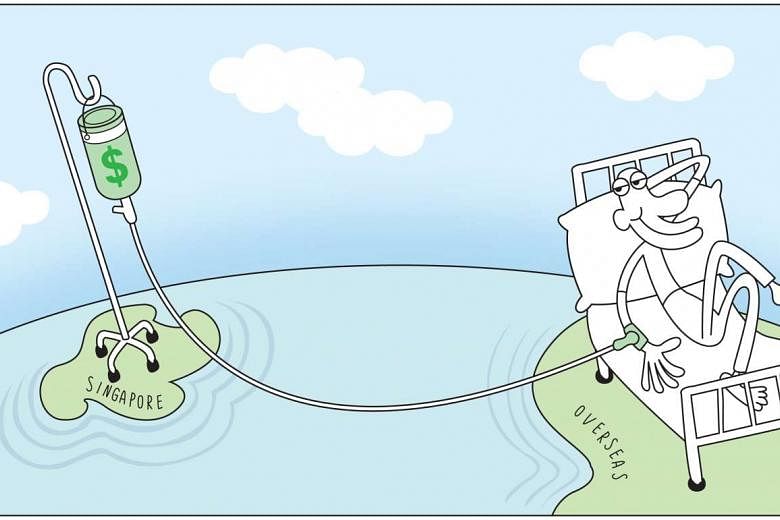The panellists at The Straits Times Future Economy Roundtable on Healthcare were quick off the bat in identifying what needs to be improved in Singapore's healthcare system and the ways to get them done.
I was particularly struck by two of their suggestions: making people more accountable for their own health, and exploiting cheaper healthcare in neighbouring countries.
Healthcare consultant Jean-Luc Butel, who is on the government-led Committee on the Future Economy, argued that a reckless driver who gets into accidents is penalised with higher insurance premiums. Similarly, a person who chooses to be an alcoholic should not expect society to pay for his treatment.
There is much merit in the argument. More than one-third of medical treatment today is for preventable diseases like Type 2 diabetes and its consequences such as kidney failure, blindness, amputation and higher risk of heart attacks and stroke.
Heavy smoking is not only strongly linked to various cancers, but also raises the risk of getting cardiovascular diseases.

Heavy drinking damages the liver, causes mental problems including depression and early onset of dementia, hypertension and several cancers. In the United States, heavy drinking accounts for one in 10 deaths.
Obese people face a higher risk of being stricken by a host of illnesses, from cancers and joint pains to diabetes and heart attacks.
But if people are held accountable for their own health - as they should be since they are also the ones who benefit most from good health - would it change their behaviour?
The chances are high that it would but the devil is in the implementation.
One major task is in differentiating what is preventable, since everyone's genetic makeup is different.
Age, gender and ethnicity affect a person's risk of certain medical conditions. As well, a person's DNA.
So, it would be unfair to penalise a person who gets sick despite every effort to prevent it. That would be a double whammy.
Another point of consideration is the effort put in by a person to keep a disease under control.
Finding the fine balance is the tricky part as the bar cannot be held so high that people give up without wanting even to try or too low so that it hardly makes a difference to the outcome.
Still, the approach is worth considering because if it succeeds, Singapore can put a lid on healthcare costs for the nation.
On the individual level, it will mean a better quality of life.
The other suggestion worth exploring is encouraging people to tap cheaper healthcare available in neighbouring countries.
Already, people with chronic ailments are going to Malaysia to buy medication as it is cheaper. The lower prices across the Causeway are because pharmaceutical companies base their prices on how wealthy a country is.
This can be expanded to non-critical procedures, such as knee or hip replacement, fixing stents for blocked arteries, chemotherapy for cancer and dental treatment.
With the proposed high-speed rail between the two countries, coupled with the favourable exchange rate, Singaporeans can enjoy considerable savings.
But there is one major obstacle: MediShield Life insurance and the Integrated Shield Plans (IPs) cannot be used for such across-the-border treatments.
There is hardly any need for such a restriction.
Some insurance companies in the United States cover their policy holders for treatments outside the country, as it means a lower payout for them. In fact, most even include the cost of travel to and from the country in calculating the reimbursement.
There are other benefits as well.
Patients' share of the bill payment will be lower, which means they are also less likely to hit their annual insurance cap.
The healthcare dollar can be stretched further too, by letting MediShield Life and IPs be used for such procedures.
Singapore has already allowed the use of an individual's Medisave for day surgery and in-patient treatment in certain Malaysian hospitals since 2010.
Naturally, safeguards need to be put in place to ensure patients receive quality treatment, and that there is no cheating, with claims made but no treatment given.
The Health Ministry can help prevent such a crime by accrediting hospitals and clinics in countries like Malaysia and Thailand, both of which boast good, quality healthcare, from the outset.
It could start with those that have hospitals on both sides of the Causeway, such as the Parkway Pantai group and Thomson Medical.
Claims can be made via the Singapore office, which could also do follow-up checks, if necessary.
Such a move may coax big healthcare groups in neighbouring countries like Thailand to set up shop here to tap the Singapore market.
Yet another plus of the move is easing the hospital bed crunch in Singapore. Similarly, the shortage of healthcare workers.
Is there a risk of Singapore doctors and hospitals facing an exodus of patients to other countries?
Highly unlikely.
Patients who need urgent care will seek it here. Those who prefer the convenience of being treated here would also stay put.
Singapore doctors could also differentiate themselves from others by focusing on providing state-of-the-art treatment. This would help push up the quality of health services.
It is a win-win situation: Local demand is eased, people concerned about cost will get more options, and Singapore doctors get the opportunity to practise cutting-edge medicine.


